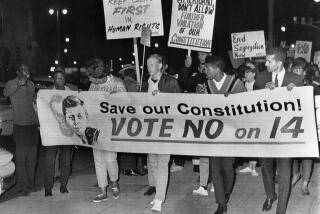‘Red Light for Reynolds’
- Share via
Your editorial (June 28), “Red Light for Reynolds,” correctly states that the “struggle over William Bradford Reynolds was a struggle over the heart of the Civil Rights Act of 1964.” But your approval of the Senate Judiciary Committee’s rejection of Reynolds and call for his dismissal as assistant attorney general for civil rights completely ignores the history of that great act.
You claim that the Reagan Administration’s view of civil rights, which insists on advancing a color-blind Constitution in its struggle against racial discrimination, is some sort of radical revision of the original intention of the Civil Rights Act. But would this law be law today, in its present form, if the congressmen who supported it had known it would be interpreted to justify hiring quotas, preferential treatment, and the very classification by race the law’s leading sponsors insisted it would eradicate? You do not advance serious discussion of such disturbing and indeed invidious distinctions by dismissing them as mere “pious legalisms about equality.”
After all, is it not reasonable to interpret the 1964 Civil Rights Act as opposing racial classification of any sort? Is this not implied by, among other language, the words of Section 703 of the act, which makes it unlawful for an employer to “limit, segregate, or classify his employees in any way which would deprive or tend to deprive any individual of employment opportunities or otherwise adversely affect his status as an employee, because of such individual’s race, color, religion, sex, or national origin”?
The central problem with your notion of “civil rights” is that it makes “minorities” wards of the central government, its tools, and ultimately its sycophants. Such minorities would be exempted from the same processes and procedures that other citizens undertake to advance and protect their interests, winning some battles and losing others.
But far from protecting racial and ethnic minorities, such condescension discourages their maturation into complete citizens who exercise the same rights and duties of other citizens. A true civil rights policy would take its bearings by healthy citizenship, not the smothering protection of various groups by a centralized bureaucratic government.
You, along with most Reagan Administration critics, cannot appreciate that its opposition to race-conscious remedies to past injustice is not only another moral battle but an extension of that very same noble struggle for the rule of law under a color-blind Constitution protecting individual rights.
KEN MASUGI
Claremont
Masugi is a member of the California Advisory Committee to U.S. Commission on Civil Rights.


